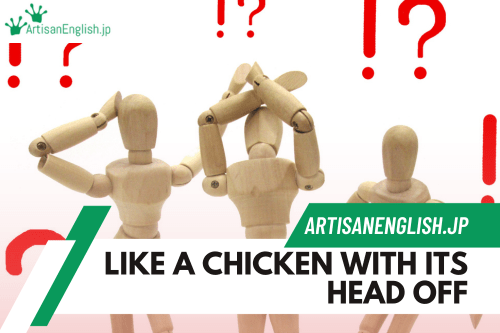
YouTube / iTunes / Spotify / Radio Public / Pocket Casts / Google Podcasts / Breaker / Overcast
Listen to ArtisanEnglish.jp posts & lesson intros here.
Phrase: Like a chicken with its head off
In a disaster, it’s natural to panic.
Fear grips us, clouding our judgment and hindering our ability to make rational decisions.
We run around like chickens with their heads off, unable to see the path ahead.
In the middle of chaos and uncertainty, it is essential to maintain composure.
When people run around like chickens with their heads off, they panic and act crazily because they have lost control.
Maintaining our composure allows us to think clearly, take practical action, and have greater control over our circumstances.
The benefits of composure extend far beyond our personal well-being.
In times of crisis, our ability to remain calm can have a ripple effect on those around us.
When we project an aura of calm, we instill confidence and reassurance in others.
We become a steadying force amid the storm, guiding those around us towards safety and stability.
Of course, resisting the urge to run around like a chicken with its head off in the face of disaster is not easy.
It requires practice, self-awareness, and a willingness to confront our fears.
Here are a few simple techniques that can help you maintain composure and not look like a chicken with its head off in times of crisis.
First, focus on your breathing.
When under stress, our breathing becomes shallow and rapid.
Focus on what you can control.
Slow down and take deep breaths.
Next, observe your surroundings by engaging your senses.
What do you see?
What do you hear?
What do you smell?
What do you feel?
Focusing on the present moment can help ground you and distract you from your worries.
You have lost composure when you run around like a chicken with its head off.
Maintain self-control by remaining calm and assessing the situation before taking action.
Flesch-Kincaid Readability Test
This post is understandable by someone with at least an 8th-grade education (age 13 – 14).
On the Flesch-Kincaid reading-ease test, this post scores 68.
The easier a passage is to read, the higher the score on a scale of 0 – 100.

